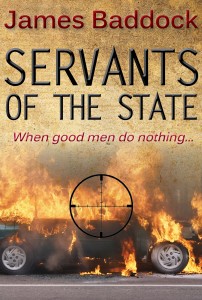All of the Cormack and Woodward books (The Dutch Caper, Emerald and Berlin Endgame) are now out on Amazon, Kobo, W H Smith and iBooks – the links are all on the website homepage. (Now all we’ve got to do is sell them!)
Monthly Archives: February 2013
State Of Play (4)
Aimee (theauthorworks.com) delivered the last book cover today – and a damn good one it is too! So here are all seven:
Cormack and Woodward – the Series
Alan Cormack and Tony Woodward are the two main characters throughout what has become known as the ‘Cormack and Woodward’ series – The Dutch Caper, Emerald and Berlin Endgame. During that time, their relationship has changed quite considerably, but, originally, there was no intention on my part to use them for more than the one book – The Radar Job (or The Dutch Caper as it now is). The idea was to have an ‘Odd Couple’ – a mis-matched pair having to team up and eventually forming a very effective partnership, so they were deliberately chosen from very different backgrounds. Cormack comes from the East End of London and is proud of it – he still has his working-class accent even though he’s an expert linguist and could get rid of it very easily if he wanted. He’s very much a maverick operator, but is also regarded as being a top-class undercover agent; very capable, resourceful, ruthless when he has to be, and cynical. Yet he’s plagued by self-doubt – his own reason for putting himself into danger is because he thinks he’s too scared to say no – he doesn’t want to seem a coward, even though he’s proved his bravery several times over. He will also move heaven and earth to protect any member of his team from danger, no matter the risk to himself. But he lives on his nerves… he’s also a lot less cynical than he likes to think he is, when it comes right down to it. As one character says of him – ‘he just needs a worthwhile reason to talk himself into risking his neck.’
He’s a complete contrast to Woodward, who comes from the landed gentry, went to public school and is a pilot in the RAF – one of the best there is, which is why he’s chosen to partner Cormack in the first book, where they have to steal a German night fighter in order to bring back its onboard radar. He will volunteer for any mission, now matter how hazardous, simply because he feels it is his patriotic duty to do so – he and Cormack despise each other when they first meet, but, by the end of the first book, each of them has saved the other’s life and there is an undeniable bond between them.
This bond is strengthened during Emerald, the second book – indeed, the success of the mission hinges just as much on Woodward’s maturing undercover skills as on Cormack’s; Woodward has lost his innocence two years earlier in Holland and is more hard-bitten than before. As a result of what they’ve been through, there’s already a close friendship by the time the two of them meet up again in Berlin Endgame – Cormack has just been appointed Head of Army Counter-Intelligence in Berlin (a case of using a thief to catch a thief – using his undercover experience to try and trap enemy agents) and Woodward is now a civilian pilot taking part in the Airlift. This book gives the opportunity to take a closer look at the relationship between them – these days, it’s called ‘bromance’, but I was thinking more in terms of that ‘bond’ when I was writing it. Endgame shows Cormack at his most vulnerable, if anything and we find out more about his back story than in the first two books put together. By the end of this third book, they are a true partnership – but both of them would laugh outright if you were to suggest it to them (while privately acknowledging the truth of the statement).
Yet there is still a lot left of their original characters: Cormack still describes Woodward as ’tilting at windmills’, while Woodward calls Cormack a ‘taciturn son of a bitch at the best of times’. Both are still accurate assessments, but they are now delivered with pure affection, between two men who feel utterly at ease with each other. They have grown over the three books – even I know far more about them now than I did when I started.
Will I use them in another book? Probably – there are still some loose ends to tie up at the end of Berlin Endgame, but I also have another idea that would fit in immediately after Emerald, which might make things a little more complicated, I suppose…
The Books: Emerald
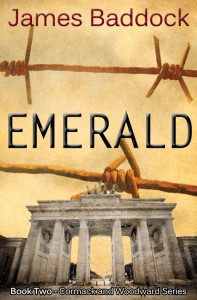 Emerald was written as the sequel to The Dutch Caper, and used the same two main characters (Cormack and Woodward), this time sent into Berlin in the dying days of the War to rescue ‘Emerald’, the codename for a highly placed SIS source in Berlin who is passing on information from with Hitler’s Bunker. The agent actually did exist and she was, very probably, the mistress of General Fegelein, one of Hitler’s personal staff. What her eventual fate was is unknown, but it was the starting point for Emerald. As with Caper, I started working on the characters at an early stage.
Emerald was written as the sequel to The Dutch Caper, and used the same two main characters (Cormack and Woodward), this time sent into Berlin in the dying days of the War to rescue ‘Emerald’, the codename for a highly placed SIS source in Berlin who is passing on information from with Hitler’s Bunker. The agent actually did exist and she was, very probably, the mistress of General Fegelein, one of Hitler’s personal staff. What her eventual fate was is unknown, but it was the starting point for Emerald. As with Caper, I started working on the characters at an early stage.
I already had Cormack and Woodward (although Woodward needed to be portrayed as a little more cynical than in Caper as a result of his experiences in Holland two years earlier; he is far less of a junior partner this time). In real life, Fegelein’s mistress came of Irish descent, according to witnesses, and was supposedly married to a Hungarian diplomat whose whereabouts in 1945 were unknown; all those who had met her agreed she was remarkably attractive. Thus, my woman agent had to have a similar back story; enter Marianne Kovacs, nee Driscoll, now desperate to escape from Berlin before the advancing Red Army moves in, but realising that Fegelein is not going to be any use to her at all. Her only chance is for someone to get her out – someone from the SIS. But she needs a lever, so she acquires a number of files concerning the ODESSA’s escape routes and tells London that if they want them, they will have to come and get her.
So that dealt with the three main characters, but I needed a ‘bad guy’ to pursue them – and he needed to be a genuine threat to them, so he had to be capable and resourceful. That ruled out a mindless Nazi thug, obeying orders unquestioningly, but it then raised the question of why the bad guy would pursue them when he would be intelligent enough to realise that capturing them would obviously make no difference to Germany’s fate. No problem – blackmail. His wife would be taken prisoner by the Soviets and so he would be forced to work for them, come what may, because he is devoted to her. Thus, with relatively little effort, Rindt came into being, a Colonel in the Gestapo, but who has risen to his senior rank through merit, pure and simple, and who is, basically, a decent man driven to destruction by his love for his wife.
Actually, it wasn’t quite that simple – I had to find a plausible way of having Rindt pursue the fugitives from Berlin to Rostock, on the Baltic Coast, but how would he (or his new masters) know they would be heading there? Enter Kim Philby… Problem solved.
What I then had was a story of betrayal on both sides, with Cormack and Woodward not knowing who to trust and Rindt being forced to work for the Russians. From then on, like Caper, the story fell into place pretty easily, with the finale worked out on paper long before I actually reached that stage in the manuscript. What I liked about it was that the reader feels a good deal of sympathy for Rindt and his predicament; as with Behrens in Caper, you have the feeling that Rindt and Cormack would have got on very well together under different circumstances. As it is, each one is finally left with no alternative but to try and kill the other one.
When the book was published, I found, to my annoyance, that the Author’s Note that was supposed to go at the end of the book had, in fact, been moved to the beginning – and it gave away far too much of the story, as far as I was concerned. That’s been corrected in the ebook version. Like its predecessors, it gained positive reviews in the States (there was even talk of the film rights being bought up at one point, but it never happened).
However, I had ‘run out of war’, in terms of any sequel; any subsequent Cormack and Woodward story would have to take place post-war, but I already had the outlines for an idea that would eventually become Berlin Endgame. That would have to wait, though – by the time I was in the closing stages of writing Emerald, I was in the planning phase of my first present day thriller, The Alaska Project.
The Books: The Radar Job / The Dutch Caper
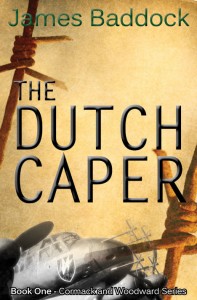 Although The Radar Job was my second published book, it was, in fact, the fourth book I had completed. Strictly speaking, my second and third books were called The Cromwell Exercise and Phoenix, but neither of them had really ‘gelled’ by the time I came to start on Radar. I had the idea from a book that my parents gave me for Christmas called The Secret War, by Brian Johnson, which described the undercover war that took place in Europe during 1939-45; it was linked to a BBC documentary series of the same name. One of the episodes stuck in my memory, describing how, in May 1943, a German Ju88 night fighter landed at Dyce airfield, just outside Aberdeen, carrying a fully operational set of the Liechtenstein airborne radar that had enabled German night fighters to shoot down a crippling number of RAF bombers. The official story was that the aircrew had defected to the UK, but what struck me was that, just at the moment when the RAF would have given their eye teeth for any information about the radar, one fully operational set was delivered into their laps. Add to that the fact that the aircraft appeared to be expected – one report said that it was escorted by six Spitfires – and I began to wonder whether it was more than simple coincidence. The subsequent fate of the defectors also seemed to be shrouded in mystery – and wasn’t May 1943 a little early for defectors? (Indeed, the level of defection by Luftwaffe pilots was almost non-existent, even during the last months of the War, let alone two years earlier.) So… what if the plane had been stolen?
Although The Radar Job was my second published book, it was, in fact, the fourth book I had completed. Strictly speaking, my second and third books were called The Cromwell Exercise and Phoenix, but neither of them had really ‘gelled’ by the time I came to start on Radar. I had the idea from a book that my parents gave me for Christmas called The Secret War, by Brian Johnson, which described the undercover war that took place in Europe during 1939-45; it was linked to a BBC documentary series of the same name. One of the episodes stuck in my memory, describing how, in May 1943, a German Ju88 night fighter landed at Dyce airfield, just outside Aberdeen, carrying a fully operational set of the Liechtenstein airborne radar that had enabled German night fighters to shoot down a crippling number of RAF bombers. The official story was that the aircrew had defected to the UK, but what struck me was that, just at the moment when the RAF would have given their eye teeth for any information about the radar, one fully operational set was delivered into their laps. Add to that the fact that the aircraft appeared to be expected – one report said that it was escorted by six Spitfires – and I began to wonder whether it was more than simple coincidence. The subsequent fate of the defectors also seemed to be shrouded in mystery – and wasn’t May 1943 a little early for defectors? (Indeed, the level of defection by Luftwaffe pilots was almost non-existent, even during the last months of the War, let alone two years earlier.) So… what if the plane had been stolen?
Enter The Radar Job… It was possibly the easiest book I have ever written, in that the story almost wrote itself. Faust had taken over seven years from first putting pen to paper to final manuscript, Cromwell almost as long and Phoenix was five years in the making (and they still weren’t finished, anyway); Radar took just over twelve months to be ready for publishing. A good deal of the reason for this was that I had learned from the mistakes of the previous efforts, in particular in terms of setting up the characters at an early stage of the writing process, so that, as much as possible, their actions would be consistent and plausible rather than dictated by plot demands. Thus, Alan Cormack and Tony Woodward came into being, an example of the ‘odd couple’, two very different characters from diverse backgrounds thrown together and having to make the best of it. Thus, there was Cormack, cynical, disillusioned, insubordinate, coming from an East End background, and Woodward, son of an hereditary knight, product of a public school, heir to a large country estate, a top RAF pilot, naïve in terms of undercover operations, and with a deeply ingrained sense of duty and patriotism. They dislike each other on sight – but by the end of the book, each one has saved the other’s life and they have become an effective team.
The point was that I was able to provide a kind of mirror to these two in the two main German characters, Behrens and Kreissner. Behrens is a former fighter pilot ace, decorated with the Knight’s Cross, but now barred from flying duties by his wounds; he has offended a Luftwaffe general in Berlin by his willingness to speak the truth and has been sent to a dead end job in Holland for his sins (in other words, someone with a good deal in common with Cormack). Kreissner is the senior Gestapo officer in Leiden, efficient enough in routine matters, but basically unimaginative and chiefly concerned with furthering his own career. These are the two that Cormack and Woodward are up against – equally disparate backgrounds and personalities, but, potentially, a useful team if Kreissner’s experience can be allied to Behrens’s energy and resourcefulness. However, Kreissner’s refusal to countenance any co-operation means that any teamwork is not an option – in contrast to the way that the Cormack and Woodward combination developed.
One thing I wanted to deal with was the sense of loss and waste inherent in war; by the end, Cormack is wondering whether stealing the radar is truly worth the deaths of most of those helping him. Indeed, he himself has to pay a very high price at the end. I suppose I was trying to put across my own thoughts about War here.
Radar was duly published, and was then picked up by Walker Books for publication distribution in the USA and Canada, although renamed The Dutch Caper. To be honest, I prefer the Caper title, although I always think of the book as Radar. The original title almost came about by default; while I was trying to think up a title, my agent and I always referred to it as ‘The Radar Job’, firstly as a reference to it in terms of a work in progress, then, later, as an acknowledgment that ‘job’ was also slang for ‘theft’. We never did come up with a better title (or, at least one that we could agree on), so The Radar Job it was. Changing the title to The Dutch Caper was, obviously, aimed at an American market.
When it came to re-editing the book for ebook conversion, I was pleased to find that there wasn’t really much to do to it – partly because that meant less work for me, but also because the book had held up pretty well over the years (one advantage of writing WWII stories is that they’re not going to become outdated in terms of the events described – a modern thriller always runs the risk of being overtaken by what happens in the real world). All Radar needed was the correction of a few typos, some more lines of dialogue here and there, a general polishing up and it was good to go.
As I’ve said, I was pleased with Radar, right from the start. So much so that I immediately started on a sequel, Emerald, involving Cormack and Woodward, and there has since been a third in the series, Berlin Endgame. I’m working on a sequel to Endgame, and I’m toying with the idea of using Behrens again in yet another book (a meeting between him and Cormack would be interesting, to say the least…), so I’ve a lot to thank Radar for, one way or another.
The Books: Berlin Endgame
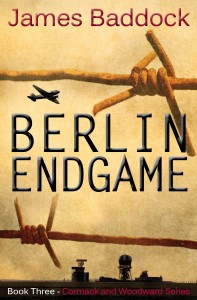 Now that the books are now available online, it might be an idea for me to say something about them – how they came to be written, what inspired them, etc, so I’m starting with the lead book in this project, Berlin Endgame. It’s been selected as the priority launch because (a) it hasn’t been previously published and (b) it ties in with two that have: The Dutch Caper (or The Radar Job) and Emerald, which both feature the same two main characters, Alan Cormack and Tony Woodward.
Now that the books are now available online, it might be an idea for me to say something about them – how they came to be written, what inspired them, etc, so I’m starting with the lead book in this project, Berlin Endgame. It’s been selected as the priority launch because (a) it hasn’t been previously published and (b) it ties in with two that have: The Dutch Caper (or The Radar Job) and Emerald, which both feature the same two main characters, Alan Cormack and Tony Woodward.
Originally titled Carronade, this is the third book in the series, set during the Berlin Blockade in 1948. The basic idea had been at the back of my mind since finishing Emerald, but I had other projects to finish first that had more substance to them; at this stage, all I had was the notion of putting Cormack and Woodward into Berlin during the Blockade, but with no more detail than that.
Once I started carrying out research into the Berlin Airlift, however, I realised just how much of a crisis situation it had been; there had been a very real threat of an armed confrontation in the city that might well have escalated into all-out war between the Soviet Union and the Western Allies. Maintaining the Trizone (which later became known as West Berlin) was seen as being a vital political priority for the West, the argument being that if Berlin were to be handed over to the USSR, then would West Germany be defended if the Soviets decided to move westwards? Hence the Airlift; the Trizone had to be protected, come what may. It was with this political knife edge in mind that I started putting the book together. ‘Carronade’ was the codename of the undercover operation that Cormack has to uncover (and still is, actually), but the original title was part of a vague idea of mine to have a series of books all named after historical weapons with unusual names – Carronade, Arquebus, Culverin, Trebuchet, etc – but I scrapped that approach fairly quickly, although I retained the Carronade title for a while. Eventually, I realised that readers would probably be expecting a novel about naval warfare in the 18th century from a book with that name and so revised it to something more potentially apocalyptic.
I began planning out the storyline, starting with the main thread – what exactly is Operation Carronade? It needed to be something that would have a profound effect on the situation in Berlin and then thought had to be given as to how Cormack would uncover it. There would have to be a change in role for Cormack – instead of being the undercover agent sent behind enemy lines, he would now have to be the investigator, gradually peeling away the levels of secrecy surrounding the plot. That was relatively easily done on the basis of Cormack being recruited back into Intelligence work as a thief to catch a thief; he had worked undercover and so knew all the dodges. Therefore, he could be assigned a post in Army Counter-Intelligence in Berlin (having already filled a similar position in Hamburg). Woodward, now a civilian pilot, would be involved in the Airlift itself and so the two could meet up again.
Unlike the previous books in the series, the two of them are not constantly trying to evade capture (or at least not in the first part of the book, anyway). This meant that I could take more time about putting in background information, both about life in Berlin, but also into their back stories – the reader finds out more about Cormack’s past and motivations than in the first two books put together; he is also shown as being at his most vulnerable. I could also explore the bond between Cormack and Woodward much more thoroughly this time, because there is far more focus on them overall; about 95% of the book is seen from their viewpoint, unlike The Dutch Caper or Emerald, where a fair proportion of the story is seen through the eyes of other characters.
The ending of the book is something of a cliffhanger, leaving a distinct possibility of a sequel – there are still a number of loose ends, one way or another – but the central story of Endgame has been resolved and so it stands up as a standalone work. (I’ve tried to make this a feature of the Cormack and Woodward series – each book tells its own story, so you don’t need to have read the previous one(s) in order to understand what’s going on.) Having said that, ideas for a follow-up to Berlin Endgame are already churning around… Watch this space!
Ebooks on Amazon
It’s finally happened… Berlin Endgame and The Dutch Caper are out in Kindle format (just click on the titles for the links).
Promo Video
It’s all happening today – AUK have just put the promo video for Berlin Endgame on Youtube, at http://youtu.be/FfUs3p_-Mqc. Embarrassing or what?
(Update) And another video – http://www.youtube.com/watch?v=0JTYqVMiXvg
Cover For The Faust Conspiracy
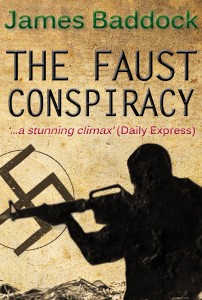 Aimee’s set up the cover for The Faust Conspiracy (shown here). It pretty much communicates the main elements of the story – all I’ve got to do now is get the proof read novel sent to AUK!
Aimee’s set up the cover for The Faust Conspiracy (shown here). It pretty much communicates the main elements of the story – all I’ve got to do now is get the proof read novel sent to AUK!
Another new development – AUK have their own blog now at andrews-uk.blogspot.com. Take a look!


